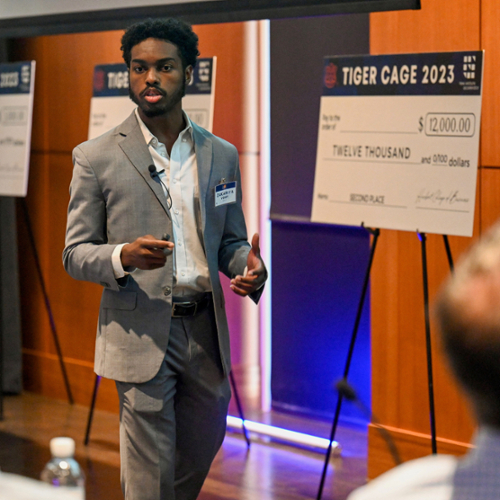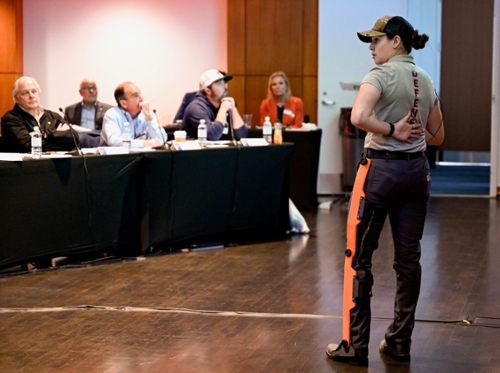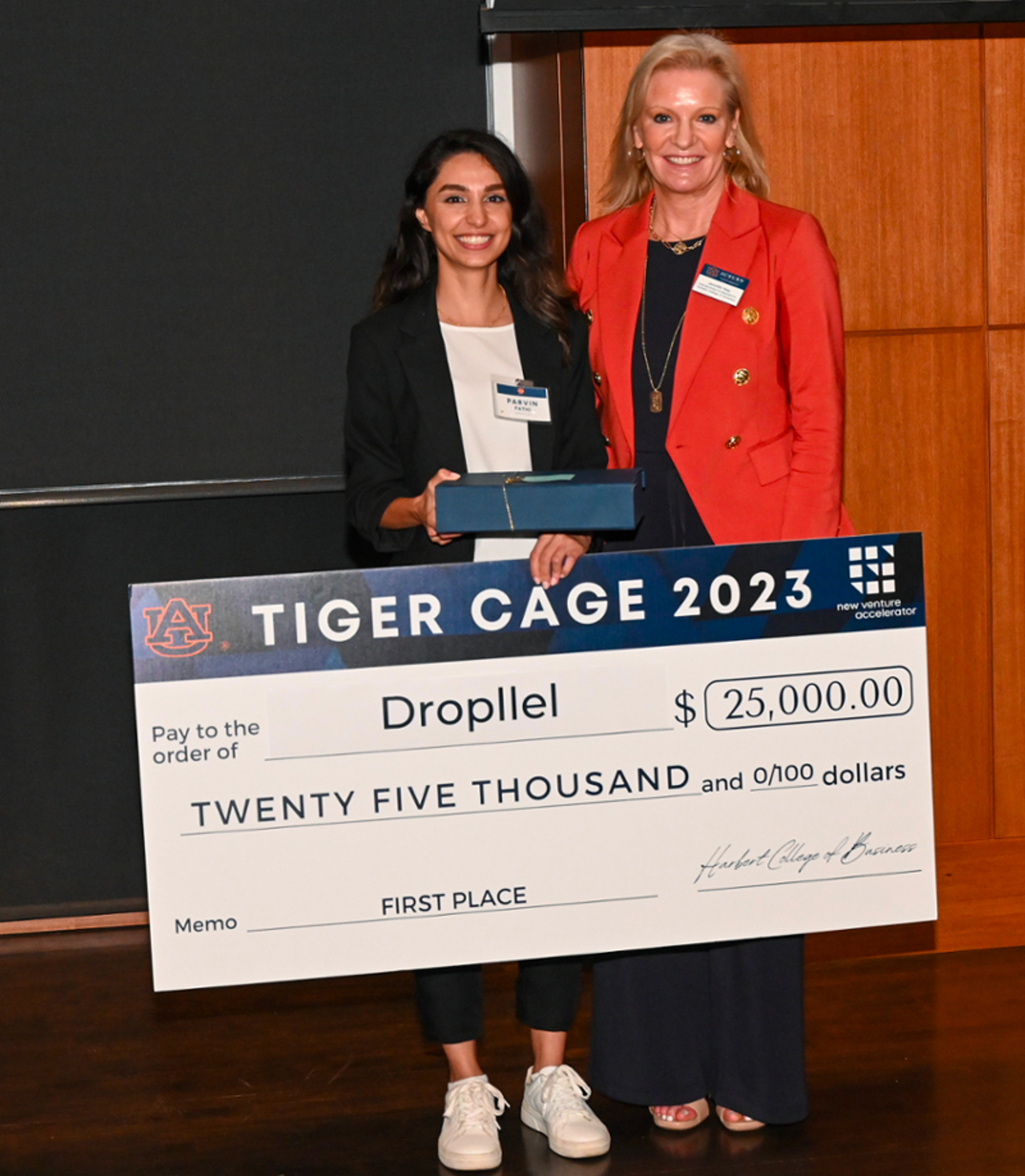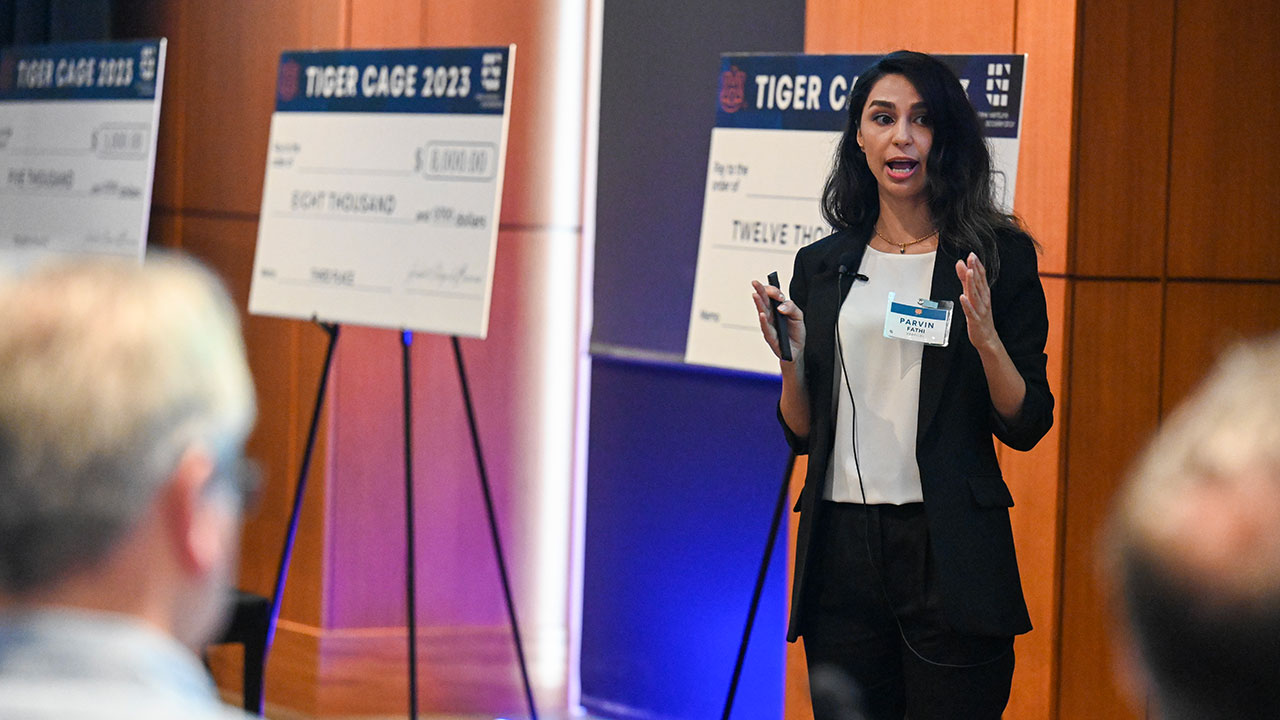Student creates device that instantly detects disease, wins pitch competition
Published: Apr 4, 2023 8:45 AM
By Joe McAdory
What if infectious diseases can be detected quickly, accurately and non-invasively? They can, and a graduate student in electrical and computer engineering knows how.
Parvin Fathi-Hafshejani developed a rapid diagnostic tool, Dropllel, that uses an electronic biosensor to detect pathogens such as viruses and can diagnose pregnancy, COVID, influenza and more. Her creation was so convincing, 13 industry professional judges awarded Fathi-Hafshejani first place and $25,000 in early-stage startup capital Friday, March 31, at Auburn University’s ninth annual Tiger Cage Business Idea Competition.
“I’m so excited, humbled, and thankful to the university’s entrepreneurship program for developing my business plan, and to the electrical and computer engineering department and my supervisor Dr. Masoud Mahjouri-Samani for providing me with the resources to produce a device that addresses a significant unmet need in the healthcare industry,” Fathi-Hafshejani said.
Dropllel also earned the $4,000 Thomas Walter Center for Technology Management “Special Award” to be used for hardware/software prototyping.

"The Tiger Cage Pitch Competition has been an incredible experience,” Fathi-Hafshejani said. “As an engineer turned entrepreneur, with a strong technical background but relatively new to the business world, I gained critical business skills such as developing a business model and market strategy as well as improving my pitching skills. Overall, it provided me with the skills, confidence and network I needed to succeed.
“Auburn Engineering provided me with a solid foundation in technical skills and problem-solving abilities. These skills are essential for developing innovative ideas and creating practical solutions to real-world problems. Additionally, the program may have offered resources focused on entrepreneurship and innovation, which would have given me exposure to the business side of engineering. This combination of technical expertise and business knowledge that new venture accelerator provided me, have equipped me with the necessary skills to turn my idea into a viable and tangible business product.”
Scott Rowe, who is pursuing a master’s degree in finance, won second place and $12,000 in early-stage startup capital with his startup, Rodopto — an agricultural company dedicated to sustainable crop production using drone technology.
A student and alumnus in computer science and software engineering, Zakariya Veasey and Evan Henley, won third place and $8,000 in early-stage startup capital for their idea, OMNIS, a peer-to-peer social platform that allows people to borrow money through the community with short-term, micro-loans.

Fourth place and $5,000 in early-stage startup capital went to mechanical engineering student Shay Pilcher’s Archangel Defense, a provider of customized combat equipment.
Presented by the Harbert College of Business and New Venture Accelerator, Tiger Cage provides students with business plan development opportunities from mentors and seasoned entrepreneurs throughout the fall and spring semesters that culminate in quarterfinal, semifinal and final round live pitch competitions before judges. Engineering students have won eight times.
Held inside Horton-Hardgrave Hall’s Broadway Event and Space Theater, students were allotted 15 minutes to pitch their ideas, followed by 15 minutes for questions from judges about financials, market shares, and product availability.
“We couldn’t be more thrilled with the business ideas, the professional level pitches the students made and hope knowing these young entrepreneurs have the potential to one day make an impact on the business world,” said Lou Bifano, director of the New Venture Accelerator. “Only one startup was awarded first place, but all four finalists were worthy.”
Fathi-Hafshejani believes Dropllel is attractive to the market and investors for multiple reasons.
“There is a growing demand for non-invasive diagnostic tools as patients and healthcare providers seek to avoid the risks and discomfort associated with traditional diagnostic methods,” she said. “The technology behind the device is innovative and has the potential to disrupt the industry by providing accurate and reliable results in a matter of seconds. This is particularly important in the case of infectious diseases, where timely diagnosis is critical for effective treatment and to prevent the spread of disease.
“Furthermore, the device has the potential to reduce healthcare costs by providing a more cost-effective and efficient diagnostic option. It can be used in a variety of settings, such as doctor's offices, clinics, hospitals and households, making it accessible to a wide range of healthcare providers and patients. Ultimately, the device has the potential to improve patient outcomes and save lives by enabling early detection of infectious diseases.”
Fathi-Hafshejani plans to use Tiger Cage as a springboard to secure funding via angel investors, grant programs and venture capitalists.
“Once I receive funding, I plan to use it to build prototypes of my device and conduct initial testing to refine its design and functionality,” she said. “After prototyping, I will begin the process of obtaining regulatory clearance from the relevant authorities to conduct clinical trials. This will involve working with clinical partners and regulatory bodies to design and implement a rigorous study protocol that will demonstrate the safety and efficacy of the device.
“Overall, my goal is to move my device from the conceptual stage to a tangible product that has the potential to improve patient outcomes and revolutionize the field of healthcare.”


Parvin Fathi-Hafshejani makes her business pitch before industry professional judges during the Tiger Cage final round on Friday, March 31.

